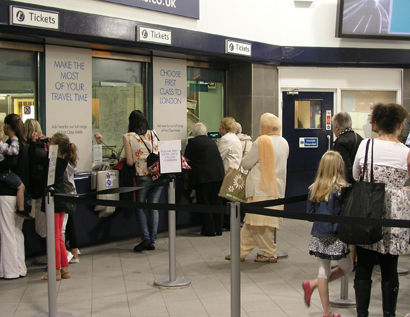FARE INCREASES are being reduced by the Government, which is cutting the limit of the 'flex' deployed by train operators from 5 per cent to 2 per cent.
The move is part of the Fares and Ticketing Review, which has been published today. Other measures include a new Marketing Review to be carried out by the Office of Rail Regulation, examining whether current markets are operating efficiently, effectively, and in the best interests of passengers and taxpayers. The Department said it is 'committed to consider any cost-effective recommendations' that result.
The Department for Transport's Fares and Ticketing Review started last year and had been due to appear this summer.
ATOC has welcomed the Review and the DfT's conclusions, but critics say the changes are 'too little, too late'.
The changes to the flex mean that the maximum increase in January will now be 6.1 per cent rather than 9.1 per cent. The baseline increase remains at RPI + 1 per cent. Companies using the flex have to reduce other journey prices to maintain the average baseline across a 'basket' of fares.
Other changes include the launch of a pilot scheme in which intercity tickets on a selected route will be sold on a 'single-leg' basis, so allowing passengers to mix and match ticket types when making a return journey. At the moment, some return fares are cheaper than a single, which has tended to cause confusion and also restrict flexibility.
The door is also being opened to flexible season tickets, which would be valid only on certain days of the week or outside the busiest peak hours. The DfT said its £45 million South East Flexible Ticketing programme will pilot these ideas next year.
There will be a new Ticketing Code of Practice, overseen by the ORR, to ensure that passengers are provided with information which is clear and not misleading, plus a 'strengthening' of the rules about how train operators change the opening hours of station ticket offices.
From next year ATOC will be committed to publish data about how well ticket office staff, ticket machines and websites manage to provide passengers with the best tickets for their journeys.
The Government had been under pressure to reform the complicated rail fares structure. Increases originally announced of RPI + 3 per cent in England and Wales have now been cut to RPI + 1 per cent for two years in succession.
Transport secretary Patrick McLoughlin said: “By capping fares we are protecting passengers from large rises at a time when family incomes are already being squeezed. We will need to wait for the rail industry to calculate individual ticket prices for next year, but this cap could save some commuters as much as £200 a year.
“Alongside this, the Government is investing over £16 billion to transform our rail network, which will make sure we can respond to increasing passenger demand and drive forward economic growth that will help strengthen our economy.”
ATOC commercial director David Mapp added: "Train companies and passengers will welcome the planned reduction in flex. Although the level of flex has always been a matter of government policy, the reduction being proposed is in line with that suggested by train companies and should help to encourage greater rail use.
“The package of measures, which train companies have worked with the government to draw up, should make it quicker and easier than ever for people to get the best value ticket for their rail journey. Operators look forward to working with the Government to introduce the changes.”
However, the reforms have received a bleak reception in some quarters.
Labour shadow transport secretary Mary Creagh said: "Under David Cameron we have a cost of living crisis. Prices have gone up faster than wages in 38 of 39 months while he has been Prime Minister and working people are almost £1,500 a year worse off.
"Over the last three years David Cameron has failed to stand up for working people, allowing train companies to hit passengers with inflation-busting fare rises of up to 9 per cent. Far from addressing his failure, this is cold comfort for commuters – it has taken 18 months, delivers fare increases of up to 6 per cent and is too little too late. This announcement doesn't go as far as Labour's plans which would prevent train companies from increasing fares beyond one per cent above inflation."
TSSA general secretary Manuel Cortes said: "This late running fares review is a slap across the face for millions of passengers who have seen their fares go through the roof under our privately run railway.
"Despite seeing walk-on fares rise by over 200 per cent since privatisation, there is no action whatsoever to actually end 'inflation plus' fare increases."


